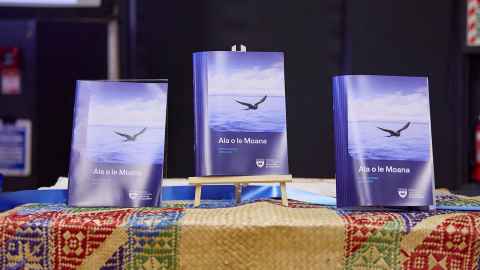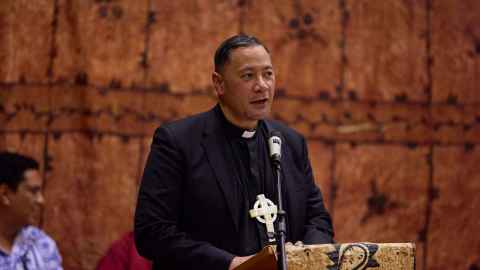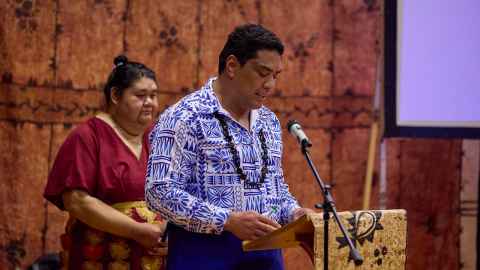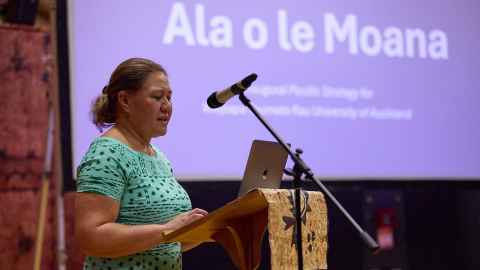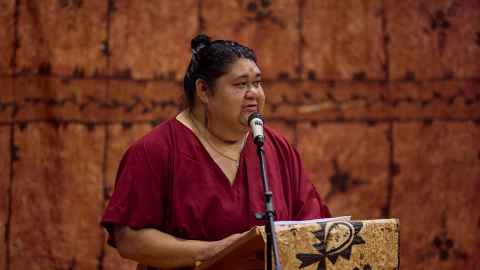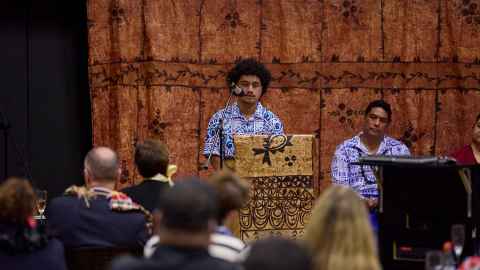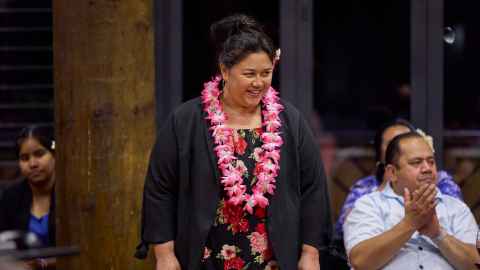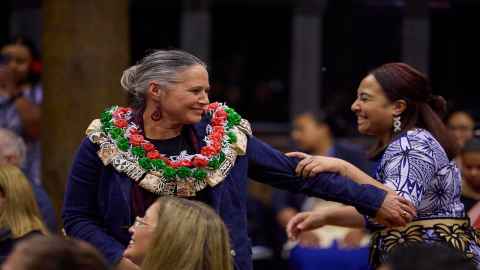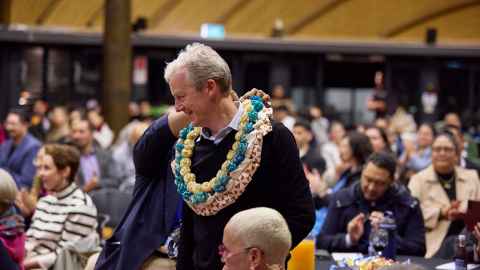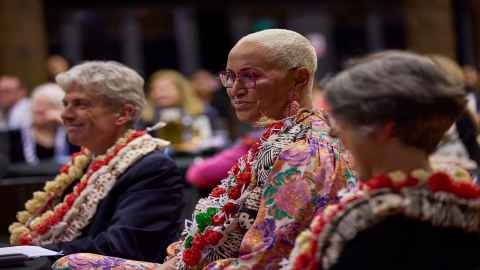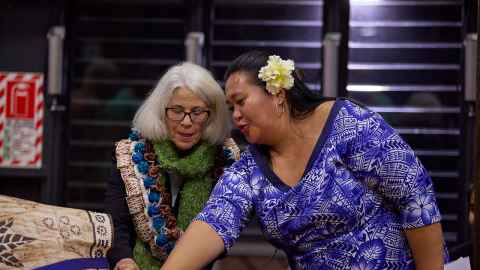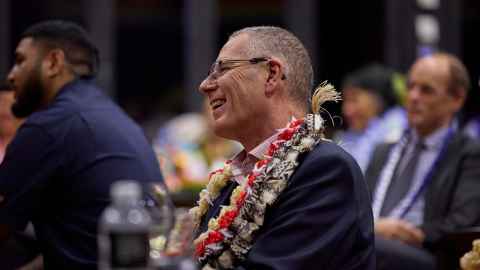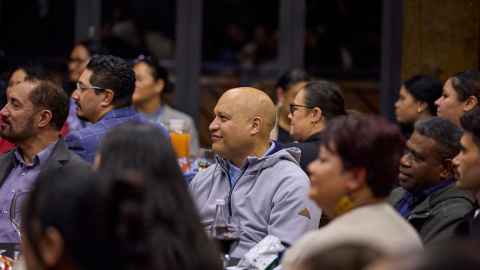Pacific Strategy Ala o le Moana (2025-2030) launches at Fale Pasifika on 9 June.
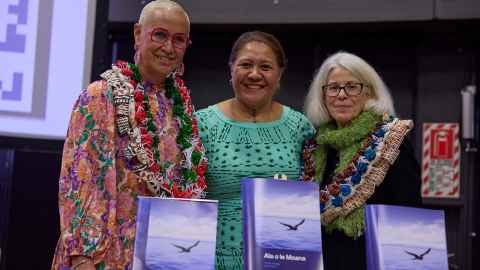
Waipapa Taumata Rau, University of Auckland, launched its first Pacific Strategy Ala o le Moana (2025-2030), on 9 June at the Fale Pasifika, marking a historic milestone in the University's 142-year journey.
A bold and enabling framework, Ala o le Moana amplifies the strengths of Pacific learners, academic and professional staff, and communities to achieve the outcomes set out in Taumata Teitei, Vision 2030 and Strategic Plan 2025.
The strategy's title Ala o le Moana (pathways of the ocean) is characteristic of Pacific peoples' journeys within and across vast oceanic expanses, highlighting their deep history, mastery and navigational expertise.
Developed under the leadership of Pro Vice-Chancellor Pacific, Professor Jemaima Tiatia-Siau, Ala o le Moana reflects the University's deep commitment to Pacific success, equity, and inclusion. The result of an extensive and rigorous University-wide collaboration over the past 15 months, Professor Tiatia-Siau says many hands helped to birth the Pacific strategy. This included consulting with Pacific communities in Aotearoa and across the region, and with strategic partners and individuals from non-Pacific communities in Aotearoa.
"This strategy is more than a document-it's a directed flightpath for transformation," says Tiatia-Siau. "It's about creating a future where Pacific learners and leaders can thrive, with an approach that recognises and celebrates their identities, values and languages, while also honouring their invaluable and unique contributions and excellence."
Dignitaries and guests from across Aotearoa gathered to celebrate the historical event, including Chief Executive and Secretary for the Ministry for Pacific Peoples Geraldine Clifford-Lidstone.
This strategy is more than a document-it's a directed flightpath for transformation.
Pro Vice-Chancellor Pacific Professor Jemaima Tiatia-Siau Waipapa Taumata Rau, University of Auckland
Tiatia-Siau acknowledged the many people and communities that played a major role to help craft and realise Ala o le Moana, giving generously of their time.
"I wish to express my heartfelt thanks and gratitude to everyone who contributed to this strategy - without your voice, leadership, knowledge and efforts, Ala o le Moana would not have come into being. This reemphasises our university's commitment, in that, we all desire a common goal, and that is to continue building, nurturing and sustaining a thriving environment for our Pacific communities."
The University's Vice-Chancellor Professor Dawn Freshwater says Ala o le Moana is an important milestone for the institution, providing a tangible and visionary roadmap for Pacific success.
"Many hands and hearts have shaped this important document - we are absolutely thrilled that, after 142 years, Ala o le Moana has been realised."
Talanoa with church leaders, community elders, youth, and business leaders ensured the strategy was grounded in the realities and aspirations of Pacific peoples. The inclusive approach reflects the University's commitment to partnership, ensuring that Ala o le Moana is both visionary and deeply rooted in collective values.
The University's legacy of Pacific excellence began in 1936, when Olive Malienafau Nelson became Waipapa Taumata Rau's first Pacific - and first Pacific woman -graduate. In 2022, the Sir Michael Jones Foundation established the Olive Malienafau Nelson Pasifika Scholarship for Excellence to honour her legacy and support Pacific excellence in law.
Today, there are more than 40,000 students at the University, with around 4,000 of them being Pacific students, and nearly 400 Pacific staff, according to the University's 2023 Pacific statistics.
The Pacific Strategy sets out five key priorities that build on the important gains made for, and by Pacific peoples at the University - Pacific excellence in the domains of: research; innovation and entrepreneurship; teaching and learning; service; and leadership.
Professor Tiatia-Siau adds the launch of the Pacific strategy was timely, following on from Kawea Ake, the University's Māori strategy, and Toitū Waipapa, the University's Māori framework. The strategy strongly positions Pacific peoples in solidarity with tangata whenua, recognising the shared aspirations for tino rangatiratanga, equity, and transformation.
She extended her deep gratitude to the Office of the Pro Vice-Chancellor Māori for its unwavering support and guidance throughout the strategy's development and senior Māori colleagues from across the university.
"We have been fortunate to have the guidance and support from tangata whenua and mana whenua, under the leadership of Pro Vice-Chancellor Māori Professor Te Kawehau Hoskins and her office, as well as the taonga of insights from our Māori whānaunga from across our institution."
Acting Deputy Pro Vice-Chancellor Pacific, Sili-Mireta Ropati, has played a pivotal role in bringing Ala o le Moana to life as a dynamic and enduring framework. She says its launch marks yet another major breakthrough for Pacific peoples in Aotearoa.
"This is a proud moment for our University and our Pacific communities," says Ropati. "It's about amplifying Pacific voices and ensuring our tauira [students] are equipped to lead with confidence and cultural pride."

